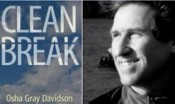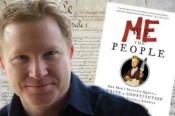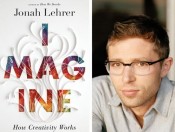Q&A: Osha Gray Davidson – Germany
Written on January 11th, 2013 |
Aired 01/06/12
In the year 2000, Germany got 6% of its energy from renewables. That’s about what we get in the US today. But today Germany gets 25% of its electricity from solar, wind and biomass. And Germany is not exactly the American Southwest. Perhaps just as impressive and important, 65% of the country’s renewable power capacity is owned by individuals, cooperatives and communities. Clean and decentralized. I’ll be talking with Osha Gray Davidson about how they did it and what we can learn from their story.
Osha is new to me, but I contacted him immediately as soon as I saw his new book CLEAN BREAK: The Story of Germany’s Energy Transformation and What Americans Can Learn from It. As anyone who listens to this show knows, I feel one of the crucial elements in America’s sluggish response to many of our biggest challenges is our ignorance about what other countries do well.
www.oshadavidson.com
Q&A: KEVIN BLEYER – Emmy-winning writer for The Daily Show & Author, ME THE PEOPLE
Written on July 19th, 2012 |
Aired 07/15/12
The Supreme Court’s been in the news a lot lately. Several of the nine justices claim to be originalists, assuming to know what the framers meant when they wrote it, and that they meant for us to follow it for the most part as written for the life of the republic. Well. No less an authority than Thomas Jefferson said the Constitution should be rewritten every 19 years.
And my next guest has taken him up on that. KEVIN BLEYER — who’s won Emmys writing for THE DAILY SHOW and has worked on President Obama’s speeches at the White House Correspondents’ Dinners – has done what he calls “a page one rewrite.” Bleyer joins me on Free Forum to talk about his new book, ME THE PEOPLE: One Man’s Selfless Quest to Rewrite the Constitution of the United States of America.
Q&A: JONAH LEHRER, Author, NYT #1 Best-Seller – IMAGINE: How Creativity Works
Written on April 11th, 2012 |
Aired 04/08/12
Do you consider yourself to be creative? Do you think of creativity as a gift, a talent, something you either have or you don’t? Do you find creativity to be a bit mystical or magical, dependent on luck, the muses, or higher powers?
Today’s guest, JONAH LEHRER, has written a book in which he looks at the latest brain science and attempts, in his words, “to collapse the layers of description separating the nerve cell from the finished symphony, the cortical circuit from the successful product.”
In Imagine: How Creativity Works, Lehrer makes clear, “Creativity shouldn’t seem like something otherworldly. It shouldn’t seem like a process reserved for artists or inventors or other “creative types.” After all, he points out, the human mind has the creative impulse built into its operating system, hard-wired into its most essential programming code.” Creativity is a variety of distinct thought processes that we can all learn to use more effectively. In the book, Lehrer reveals the importance of embracing the rut, thinking like a child, and daydreaming productively. He also shows how we can use this knowledge to make our neighborhoods more vibrant, our companies more productive, and our schools more effective.
Q&A: Steven Hill-10 Steps to Repair US Democracy
Written on March 20th, 2012 |
Aired 03/18/12
Among the things that most people agree are in big trouble these days are the European Union and democracy in the US. I will talk with today’s guest, STEVEN HILL, about both.
We have been hearing for two years about the trouble Europe is in. The debt crisis in Greece, Spain, Portugal, Ireland and beyond is challenging this federation of nations and economies to share the solutions to problems that have proven worst in individual countries who took greater risks than their more prudent neighbors. After Europe seemed to have fared better than the US in the early stages of this prolonged crash, what brought on this crisis? How close are they to solving it? How close are they to blowing it? What would Hill’s advice be? And what does it mean for the rest of the world and for the US in particular?
While the bad news of this Euro crisis makes headlines in the US, what has not made headlines is the good news contained in HILL’s 2010 book EUROPE’S PROMISE. I will check in with Hill about the current state of that promise.
Closer to home, HILL believes that America’s recent economic collapse was preceded by a longer-term political collapse. Even before the economic crisis, the US faced choice-less elections, out-of-control campaign spending,partisan polarization, a rigidly divided Congress, a filibuster-wild U.S. Senate, superficial debate, mindless media, a partisan Supreme Court, and paralysis in the face of new global challenges.
As the middle collapses and partisans take over, Americans’ frustration grows – witness the Tea Party and the 99%. In a brand new 2012 Election edition of his 2006 book, Steven Hill renews his 10 Steps to Repair American Democracy.
Q&A: TOM FRANK – What’s the Matter with Kansas? / EDGAR CAHN – founder of Legal Services & Time Dollars
Written on January 10th, 2012 |
Aired 01/08/12
This will be a conversation about the state of things as we embark on 2012. I will be joined by TOM FRANK (What’s the Matter with Kansas?) and EDGAR CAHN (founder of Legal Services and Time Dollars). We will talk about their passions and projects.
In his new book, PITY THE BILLIONAIRE, Frank examines how the crash that has hurt so many millions of Americans has delivered wildly perverse political results. He gives us a diagnosis of the cultural malady that has transformed collapse into profit, reconceived the Founding Fathers as heroes from an Ayn Rand novel, and enlisted the powerless in a fan club for the prosperous.
Edgar Cahn was a serial social entrepreneur before the term was invented. In 1974, he and his wife co-founded the Legal Services Program to deliver legal services to the poor, then co-founded Antioch School of Law, where students learned through providing legal services to the poor. Two decades later Cahn created TIme Dollars, a system to bank and exchange services rather than currency.
In the larger conversation, I want to take a fairly big picture, historical, and forward-looking perspective. While I assume we will talk about global economics and international conflicts, the emphasis would be on the US. Though I assume we will talk about the fall election, I want to look more broadly.
Questions like: Where are we as a society – socially, culturally, economically, and politically? What’s working and why is it working? What are your fears and hopes for the year ahead? What stories and narratives will you be paying attention to in the next year?
Maybe something about the battle over the narrative of America’s founding and the American dream. Is there a story in which humanity turns things around?
THOMAS FRANK, a former opinion columnist for The Wall Street Journal, is the founding editor of The Baffler and a monthly columnist for Harper’s. He is the author of The Conquest of Cool; What’s the Matter with Kansas? One Market Under God; and his newest, PITY THE BILLIONAIRE.
EDGAR CAHN teaches Law and Justice, and directs the Community Service Program at the University of the District of Columbia School of Law. A co-founder with his late wife Jean Camper Cahn of the Antioch School of Law, UDC-DCSL’s predecessor; the first law school in the United States to educate law students primarily through clinical training in legal services to the poor. In the late 1980s, Professor Cahn began the Time Dollars project, a service credit program that now has more than 70 communities in the US, UK and Japan with registered programs (www.timebanks.org). He’s the author of several books, including Hunger USA, Time Dollars and No More Throw-Away People.
